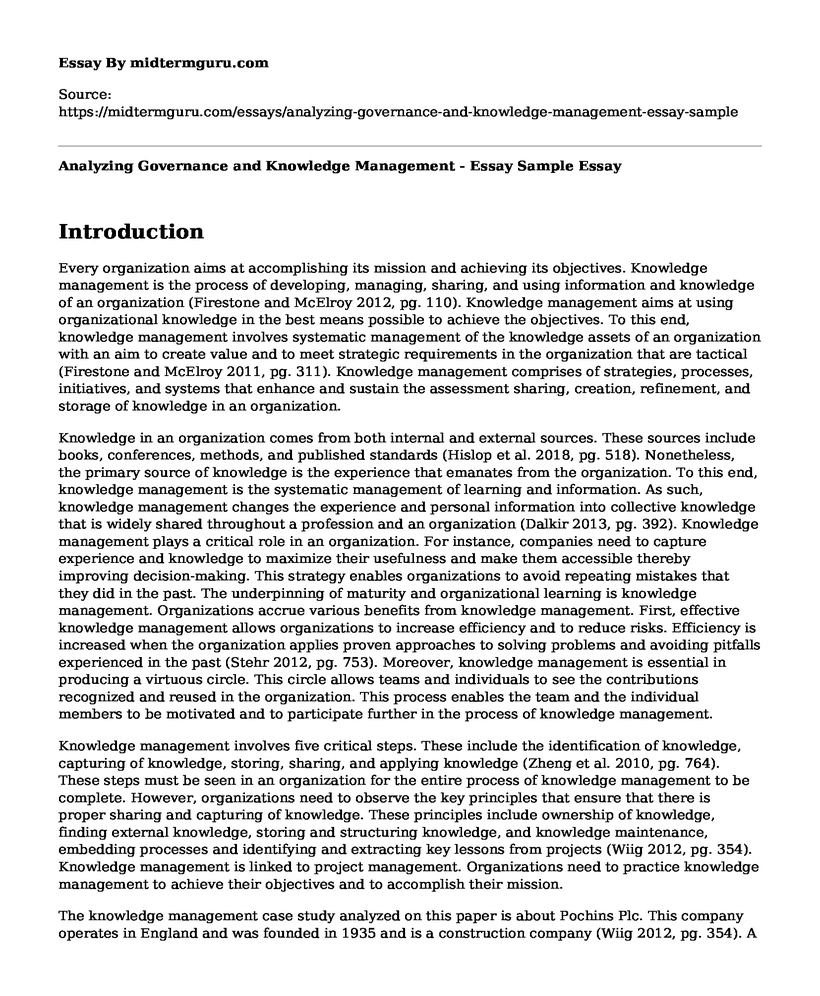Introduction
Every organization aims at accomplishing its mission and achieving its objectives. Knowledge management is the process of developing, managing, sharing, and using information and knowledge of an organization (Firestone and McElroy 2012, pg. 110). Knowledge management aims at using organizational knowledge in the best means possible to achieve the objectives. To this end, knowledge management involves systematic management of the knowledge assets of an organization with an aim to create value and to meet strategic requirements in the organization that are tactical (Firestone and McElroy 2011, pg. 311). Knowledge management comprises of strategies, processes, initiatives, and systems that enhance and sustain the assessment sharing, creation, refinement, and storage of knowledge in an organization.
Knowledge in an organization comes from both internal and external sources. These sources include books, conferences, methods, and published standards (Hislop et al. 2018, pg. 518). Nonetheless, the primary source of knowledge is the experience that emanates from the organization. To this end, knowledge management is the systematic management of learning and information. As such, knowledge management changes the experience and personal information into collective knowledge that is widely shared throughout a profession and an organization (Dalkir 2013, pg. 392). Knowledge management plays a critical role in an organization. For instance, companies need to capture experience and knowledge to maximize their usefulness and make them accessible thereby improving decision-making. This strategy enables organizations to avoid repeating mistakes that they did in the past. The underpinning of maturity and organizational learning is knowledge management. Organizations accrue various benefits from knowledge management. First, effective knowledge management allows organizations to increase efficiency and to reduce risks. Efficiency is increased when the organization applies proven approaches to solving problems and avoiding pitfalls experienced in the past (Stehr 2012, pg. 753). Moreover, knowledge management is essential in producing a virtuous circle. This circle allows teams and individuals to see the contributions recognized and reused in the organization. This process enables the team and the individual members to be motivated and to participate further in the process of knowledge management.
Knowledge management involves five critical steps. These include the identification of knowledge, capturing of knowledge, storing, sharing, and applying knowledge (Zheng et al. 2010, pg. 764). These steps must be seen in an organization for the entire process of knowledge management to be complete. However, organizations need to observe the key principles that ensure that there is proper sharing and capturing of knowledge. These principles include ownership of knowledge, finding external knowledge, storing and structuring knowledge, and knowledge maintenance, embedding processes and identifying and extracting key lessons from projects (Wiig 2012, pg. 354). Knowledge management is linked to project management. Organizations need to practice knowledge management to achieve their objectives and to accomplish their mission.
The knowledge management case study analyzed on this paper is about Pochins Plc. This company operates in England and was founded in 1935 and is a construction company (Wiig 2012, pg. 354). A review of the case study reveals that the company practices knowledge management by implementing a system called innovation forum whereby every employee is allowed to contribute ideas into this forum. When combined these ideas make up the knowledge that is needed to enable the organization to achieve its goals and objectives. The information that these company hosts include contact lists, daily notices, health and safety information, standard work procedures, and standard forms. This company allows wide sharing of information within a majority of the construction sites. Pochins Plc practices knowledge management but has problems with capturing the knowledge since their process of knowledge management fails to support the knowledge creation lifecycle. Pochins Plc needs an efficient knowledge management system that is not confusing and one that supports knowledge creation.
Conclusion
Knowledge management comprises of strategies, processes, initiatives, and systems that enhance and sustain the assessment sharing, creation, refinement, and storage of knowledge in an organization. Pochins Plc needs an efficient knowledge management system that is not confusing and one that supports knowledge creation. Pochins Plc also needs to capture knowledge in static nature to support the existing platforms of knowledge. Again, must observe the steps of knowledge management which include identification of knowledge, capturing of knowledge, storing, sharing, and applying knowledge. These steps must be seen at Pochins Plc for the entire process of knowledge management to be complete.
References
Dalkir, K., 2013. Knowledge management in theory and practice. Routledge.
Firestone, J.M. and McElroy, M.A. eds., 2011. Handbook of organizational learning and knowledge management. John Wiley & Sons.
Firestone, J.M. and McElroy, M.W., 2012. Key issues in the new knowledge management. Routledge.
Hislop, D., Bosua, R., and Helms, R., 2018. Knowledge management in organizations: A critical introduction. Oxford University Press.
Stehr, N., 2012. Knowledge societies. The WileyBlackwell Encyclopedia of Globalization.
Wiig, K., 2012. People-focused knowledge management. Routledge.
Zheng, W., Yang, B. and McLean, G.N., 2010. Linking organizational culture, structure, strategy, and organizational effectiveness: Mediating role of knowledge management. Journal of Business Research, 63(7), pp.763-771.
Cite this page
Analyzing Governance and Knowledge Management - Essay Sample . (2022, Nov 06). Retrieved from https://midtermguru.com/essays/analyzing-governance-and-knowledge-management-essay-sample
If you are the original author of this essay and no longer wish to have it published on the midtermguru.com website, please click below to request its removal:
- The Concept of Superconductivity in Production - Essay Example
- Paper Example on Abilene Paradox and Group Think
- Evaluation Paper on Burberry
- Summary of Johnson&Johnson Inc and Starbucks - Essay Sample
- Ethics in Communication: Ensuring Authentic Communication for Businesses - Essay Sample
- Human Service Research Institute - Essay Sample
- Tackling Depression in Older Adults: Engaging All Stakeholders - Research Paper







